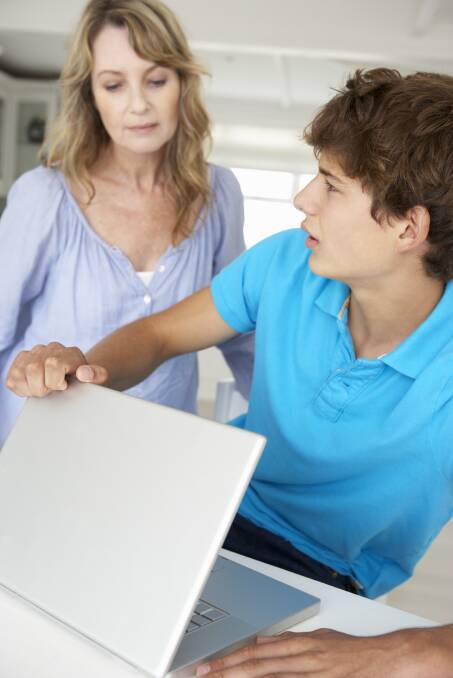My mum was an enthusiast for sex. She loved it. Dad loved it. There was never a time in my life where I had the feeling sex would be bad, dirty or painful. Sure, it was all framed in the context of a loving relationship but her guidance was not a bad start to understanding how sex should work.
I knew about birds, bees and babies from an early age and that then progressed to more interesting conversations, mainly with mum. Dad went all awkward on discussing female pleasure with a teenager.
Is that the reason I've never felt any curiosity about porn, now cited as a key driver of increased levels of violence against women. Maybe it was the time; it wasn't as readily available last century. Instead we ran with what we had at the time, the warmth and availability of others and our own vivid imaginations and desire for experimentation. But Australian research tells us nearly 100 per cent of boys see porn before the age of 24 (and perhaps the rest are telling porkies).
Any and all ideas are welcome and it would be good to even have a pause in the relentless exposure of young people to violence. But I also think we need a dramatic rethink about how we talk to young people about sex.

Turns out most exposure to porn occurs when participants were alone and at home, regardless of gender. So says Queensland University of Technology's Professor Michael Flood, one of a small handful of men in Australia writing with clarity about gendered violence. Here's what he found. Young men are more likely than young women to seek pornography out and to view it frequently. More than half of young men say they use pornography every week compared with one in seven women. But here's the kicker. Boys and young men see pornography three and a bit years before they have sex with a partner. Girls see it two years before they have sex with a partner.
That's our problem, really. Our kids are getting a manual for driving before getting the chance to drive. The problem with porn is not the erotic materials in themselves but how they portray what researchers call "sexual scripts". What they tell us about warmth and generosity. What they tell us about patience and tenderness. What they tell us about violence.
Why are we talking about this now? The government has decided to go ahead with a new approach to porn after wimping out last year. The federal government will introduce legislation to ban deepfake pornography, fund a pilot of digital age assurance technology and pursue "long overdue" classification reforms to counter violence against women, write Canberra Times reporters Dana Daniel and Miriam Webber.
Good luck with all of that. I love the idea of digital age assurance technology and just wonder how long it will be before the older friend figures out how to get around that, in just the same way as the older friend buys the booze. Experts tell me I'm too pessimistic and that parenting three teenagers is not evidence.
Maree Crabbe, director of It's Time We Talked, has just come back from making a presentation in Geneva at the World Health Organisation where she talked about the harms of porn.
Of course, she says, it's important for parents to get better at talking about sex and sexuality.
"Culturally we need to have conversations about sex that are open and honest, that are not about shaming or negative about sexuality. Our children need a vision of sexuality that is genuinely pleasurable for everyone involved and maintains the care and dignity of our partners," she says.
Which isn't how most porn pans out.

In interviews for Crabbe's research, a UK expert told her there was an "explosion" in harmful sexual behaviours in children, even children younger than 10. The harms were more intense, more violent, more abusive, faster and rougher.
And what he said was in the past, for many generations, we learned about sex on the job, so to speak. Yes, there were harms but as a society, very broadly, people found their way to enjoyable sex. That was before the juggernaut of pornography.
Crabbe says it's fine for me to suggest parents should do more and better but to remember it is tough to require parents to combat the influence of a global multibillion-dollar industry. Yes, we need to have more of these awkward conversations but it is entirely unreasonable to put all the responsibility on parents, because we are just one of a wide range of stakeholders. She believes this new porn passport will lighten parental responsibility because, shockingly, about half of the kids who access porn do it by accident on the first occasion.
But schools also need to get on board. Our children need to have teachers who know their stuff. School-based sexuality education programs can make a significant contribution, she says, and funding staff to be experts on relationships and sexuality is important if we want our kids to survive. We want our English teachers to be experts in English and our maths teachers to be experts in maths. Our teachers who are delivering sexuality education need to be experts in their field.
I get this is confronting. It's confronting when telling your own kids but imagine being faced with a classroom full making jokes and relevant hand gestures. Dear god.
Crabbe says we can't ignore porn exists and young people will be exposed to it. I ask her whether ethical porn is possible. Sure, kind of, but kids aren't exposed to that. They are exposed to violence and misogyny.
Maybe we need a traffic light approach, or as Michael Flood puts it, a health porn tick of approval.
My god, I am so happy my days of talking to teens about sex are well and truly over.
- Jenna Price is a regular columnist and a visiting fellow at the Australian National University.
Support is available for those who may be distressed: Lifeline 13 11 14; Men's Referral Service 1300 776 491; Kids Helpline 1800 551 800; beyondblue 1300 224 636; 1800-RESPECT 1800 737 732; National Elder Abuse 1800 ELDERHelp (1800 353 374)


